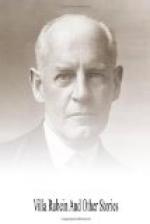His spirits rose, but soon fell again. What chance had he of catching them? They had three hours’ start! Still, the roads were heavy from the rain of the last two nights—they had luggage and bad horses; his own were good, his driver bribed—he might overtake them by ten o’clock! But did he want to? What a fool he had been not to bring his luggage; he would then have had a respectable position. What a brute he would look without a change of shirt, or anything to shave with! He saw himself with horror, all bristly, and in soiled linen. People would think him mad. ‘I’ve given myself away,’ flashed across him, ’what the devil can I say to them?’ and he stared sullenly at the driver’s back. He read Rozsi’s letter again; it had a scent of her. And in the growing darkness, jolted by the swinging of the carriage, he suffered tortures from his prudence, tortures from his passion.
It grew colder and dark. He turned the collar of his coat up to his ears. He had visions of Piccadilly. This wild-goose chase appeared suddenly a dangerous, unfathomable business. Lights, fellowship, security! ‘Never again!’ he brooded; ‘why won’t they let me alone?’ But it was not clear whether by ‘they’ he meant the conventions, the Boleskeys, his passions, or those haunting memories of Rozsi. If he had only had a bag with him! What was he going to say? What was he going to get by this? He received no answer to these questions. The darkness itself was less obscure than his sensations. From time to time he took out his watch. At each village the driver made inquiries. It was past ten when he stopped the carriage with a jerk. The stars were bright as steel, and by the side of the road a reedy lake showed in the moonlight. Swithin shivered. A man on a horse had halted in the centre of the road. “Drive on!” called Swithin, with a stolid face. It turned out to be Boleskey, who, on a gaunt white horse, looked like some winged creature. He stood where he could bar the progress of the carriage, holding out a pistol.
‘Theatrical beggar!’ thought Swithin, with a nervous smile. He made no sign of recognition. Slowly Boleskey brought his lean horse up to the carriage. When he saw who was within he showed astonishment and joy.
“You?” he cried, slapping his hand on his attenuated thigh, and leaning over till his beard touched Swithin. “You have come? You followed us?”
“It seems so,” Swithin grunted out.
“You throw in your lot with us. Is it possible? You—you are a knight-errant then!”
“Good God!” said Swithin. Boleskey, flogging his dejected steed, cantered forward in the moonlight. He came back, bringing an old cloak, which he insisted on wrapping round Swithin’s shoulders. He handed him, too, a capacious flask.
“How cold you look!” he said. “Wonderful! Wonderful! you English!” His grateful eyes never left Swithin for a moment. They had come up to the heels of the other carriage now, but Swithin, hunched in the cloak, did not try to see what was in front of him. To the bottom of his soul he resented the Hungarian’s gratitude. He remarked at last, with wasted irony:




